名词从句
什么叫名词性从句
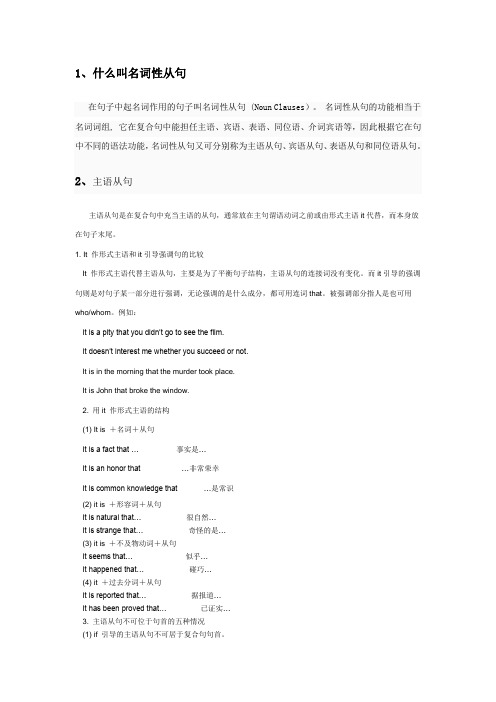
1、什么叫名词性从句在句子中起名词作用的句子叫名词性从句 (Noun Clauses)。
名词性从句的功能相当于名词词组, 它在复合句中能担任主语、宾语、表语、同位语、介词宾语等,因此根据它在句中不同的语法功能,名词性从句又可分别称为主语从句、宾语从句、表语从句和同位语从句。
2、主语从句主语从句是在复合句中充当主语的从句,通常放在主句谓语动词之前或由形式主语it代替,而本身放在句子末尾。
1. It 作形式主语和it引导强调句的比较It 作形式主语代替主语从句,主要是为了平衡句子结构,主语从句的连接词没有变化。
而it引导的强调句则是对句子某一部分进行强调,无论强调的是什么成分,都可用连词that。
被强调部分指人是也可用who/whom。
例如:It is a pity that you didn’t go to see the film.It doesn’t interest me whether you succeed or not.It is in the morning that the murder took place.It is John that broke the window.2. 用it 作形式主语的结构(1) It is +名词+从句It is a fact that … 事实是…It is an honor that …非常荣幸It is common knowledge that …是常识(2) it is +形容词+从句It is natural that… 很自然…It is strange that… 奇怪的是…(3) it is +不及物动词+从句It seems that… 似乎…It happened that… 碰巧…(4) it +过去分词+从句It is reported that… 据报道…It has been proved that… 已证实…3. 主语从句不可位于句首的五种情况(1) if 引导的主语从句不可居于复合句句首。
名词性从句

语序:陈述语序
在句中充当主语的从句称为主语 从句。英语中主语从句的句型可分 为两大类: 直接将主语从句放在主语位置上; 用it作形式主语,将真正的主语从 句后移,放在其他成分后。
让我们先说说第一类吧!
一、连接词(只起连接作用,在从句中不充当句子成分)
that:无词义。 e.g.: 他赢得比赛一事在我国引起巨大轰动。 That he won the game made a tremendous stir in our country. whether:“是否”。可单独使用,也可与or或or not连用。 e.g.: 我们明天是否能去春游取决于天气。 Whether we can go for a spring outing depends on the weather. 他们是否会来还未告诉我们。 Whether they will come has not been told to us.
四、主语从句与主谓一致
一个从句作主语时,谓语动词通常用单数形式, 特别是用it作形式主语的句型。 e.g.: Whether this kind of chemicals is better has not been tried.
当what引导主从,应遵循意义一致原则,谓语动 词选用相应形式。表语是复数时,谓语动词用复数 形式。 e.g.: What we do willingly is easy. What they were searching for were the missing gems.
Introduction
名词性从句:包括四种:主语从句、表语从句、宾语从
句、同位语从句。
连词:引导名词性从句的连词有以下三类
连接词:只起连接作用,在从句中不充当句子成分; 连接代词:连接主从句,并在从句中作主语/宾语/表 语/定语; 连接副词:连接主从句,并在从句中作时状/地状/原 因状/方式状。
名词性从句
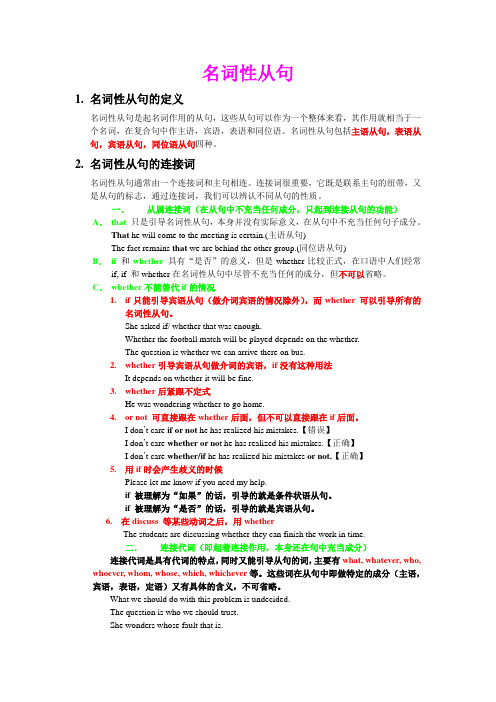
名词性从句1.名词性从句的定义名词性从句是起名词作用的从句,这些从句可以作为一个整体来看,其作用就相当于一个名词,在复合句中作主语,宾语,表语和同位语。
名词性从句包括主语从句,表语从句,宾语从句,同位语从句四种。
2.名词性从句的连接词名词性从句通常由一个连接词和主句相连。
连接词很重要,它既是联系主句的纽带,又是从句的标志,通过连接词,我们可以辨认不同从句的性质。
一.从属连接词(在从句中不充当任何成分,只起到连接从句的功能)A.that 只是引导名词性从句,本身并没有实际意义,在从句中不充当任何句子成分。
That he will come to the meeting is certain.(主语从句)The fact remains that we are behind the other group.(同位语从句)B.if和whether具有“是否”的意义,但是whether比较正式,在口语中人们经常if, if 和whether在名词性从句中尽管不充当任何的成分,但不可以省略。
C.whether不能替代if的情况1.if只能引导宾语从句(做介词宾语的情况除外),而whether 可以引导所有的名词性从句。
She asked if/ whether that was enough.Whether the football match will be played depends on the whether.The question is whether we can arrive there on bus.2.whether引导宾语从句做介词的宾语,if没有这种用法It depends on whether it will be fine.3.whether后紧跟不定式He was wondering whether to go home.4.or not 可直接跟在whether后面,但不可以直接跟在if后面。
名词性从句
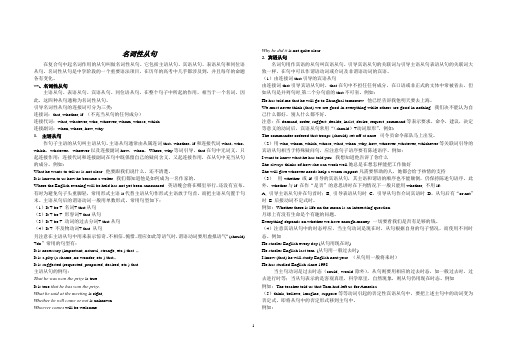
名词性从句在复合句中起名词作用的从句叫做名词性从句。
它包括主语从句、宾语从句、表语从句和同位语从句。
名词性从句是中学阶段的一个重要语法项目,在历年的高考中几乎都涉及到,并且每年的命题各有变化。
一、名词性从句主语从句、表语从句、宾语从句、同位语从句,在整个句子中所起的作用,相当于一个名词。
因此,这四种从句通称为名词性从句。
引导名词性从句的连接词可分为三类:连接词:that, whether, if (不充当从句的任何成分)连接代词:what, whatever, who, whoever, whom, whose, which.连接副词:when, where, how, why1.主语从句作句子主语的从句叫主语从句。
主语从句通常由从属连词that,whether,if和连接代词what,who,which,whatever,whoever以及连接副词how,when,Where, why等词引导。
that在句中无词义,只起连接作用;连接代词和连接副词在句中既保留自己的疑问含义、又起连接作用,在从句中充当从句的成分。
例如:What he wants to tell us is not clear. 他要跟我们说什么,还不清楚。
It is known to us how he became a writer. 我们都知道他是如何成为一名作家的。
Where the English evening will be held has not yet been announced. 英语晚会将在哪里举行,还没有宣布。
有时为避免句子头重脚轻,常用形式主语it代替主语从句作形式主语放于句首,而把主语从句置于句末。
主语从句后的谓语动词一般用单数形式。
常用句型如下:(1)It + be + 名词+ that从句(2)It + be + 形容词+ that从句(3)It + be + 动词的过去分词+ that从句(4)It + 不及物动词+ that 从句另注意在主语从句中用来表示惊奇、不相信、惋惜、理应如此等语气时,谓语动词要用虚拟语气“(should) +do”常用的句型有:It is necessary (important, natural, strange, etc.) that …It is a pity (a shame, no wonder, etc.) that…It is suggested (requested, proposed, desired, etc.) that主语从句的例句:That he was won the prize is true.It is true that he has won the prize.What he said at the meeting is right,Whether he will come or not is unknown.Whoever comes will be welcome. Why he did it is not quite clear.2. 宾语从句名词句用作宾语的从句叫宾语从句。
名词性从句最全

• 5)引导位于句首的主语从句,引导表语从句、引导同位 语从句时应当用whether,不用if。
• Whether the news is true remains a question. • 6)作discuss等动词的宾语时,用whether不用if。 • We discussed whether we should close the shop.
• He didn't tell me when we would meet again.
• 他没有告诉我我们什么时候会再见面。
• Do you remember how he came?你记得他是怎么来的 吗?
2.动词(词组)后的宾语从句
• 大多数及物动词和动词(词组)后都可以跟宾语从句,需 要注意的是:
词that不可省略。
• Everyone could see, I believe, that Mike was very terrified. 我相信人人都能看出迈克很害怕。
• 2)如果主句的谓语动词后面带有两个或两个以上并列的 宾语从句,通常只有第一个宾语从句的that可以省略, 其余从句的that不能省略。
主语从句在句中做------ 主语 表语从句在句中做------ 表语
宾语从句在句中做------ 宾语 同位语从句在句中----- 同位语
1. That he will come is certain.
主语从句
2. I know that he will come.
宾语从句
3. The truth is that I have been there.
• I don't know whether or not they could pass the exam. • 我不知道他们是否能通过考试。 • 2)引导从句位于介词之后时
名词性从句
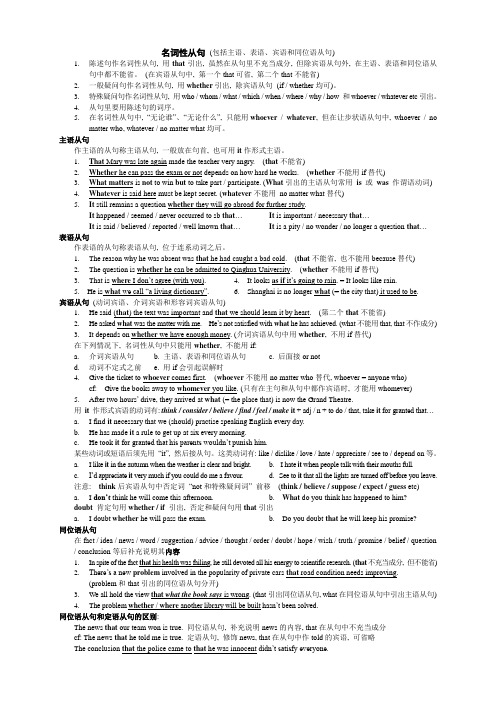
名词性从句(包括主语、表语、宾语和同位语从句)1.陈述句作名词性从句, 用that引出, 虽然在从句里不充当成分, 但除宾语从句外, 在主语、表语和同位语从句中都不能省。
(在宾语从句中, 第一个that可省, 第二个that不能省)2.一般疑问句作名词性从句, 用whether引出, 除宾语从句(if / whether均可)。
3.特殊疑问句作名词性从句, 用who / whom / what / which / when / where / why / how 和whoever / whatever etc引出。
4.从句里要用陈述句的词序。
5.在名词性从句中, “无论谁”、“无论什么”, 只能用whoever/ whatever, 但在让步状语从句中, whoever / nomatter who, whatever / no matter what均可。
主语从句作主语的从句称主语从句, 一般放在句首, 也可用it作形式主语。
1.That Mary was late again made the teacher very angry. (that不能省)2.Whether he can pass the exam or not depends on how hard he works. (whether不能用if替代)3.What matters is not to win but to take part / participate. (What引出的主语从句常用is或was作谓语动词)4.Whatever is said here must be kept secret. (whatever不能用no matter what替代)5.It still remains a question whether they will go abroad for further study.It happened / seemed / never occurred to sb that…It is important / necessary that…It is said / believed / reported / well known that…It is a pity / no wonder / no longer a question that…表语从句作表语的从句称表语从句, 位于连系动词之后。
名词性从句
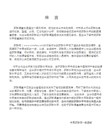
D.引导同位语从句时,切不可错用which。例如:
Word has come that some American guests will come to visit our school next week. 有消息说下周将有一些美国客人来我校参观。
____ you have seen both fighters, ____ will win?
A. Since; do you think who B. As; who you think
C. When; whoever D. Since; who do you think
解析:根据上面的讲解,不难知道答案是D。其中do you think是插入成分,其余部分是宾语从句,作think的宾语;由于引导词在从句中作主语,所以要用主格who(不用whom)。
-I drove to Zhuhai for the air show last week.
-Is that ____ you had a few days off?
A. why B. when C. that D. where
解析:答案是A,why引导的从句作表语,同时why在从句中作原因状语。这里之所以选why,而不是when或 where等,唯一的依据便是句子的逻辑含义,及语境。
whatever,whoever,whichever引导名词性从句
一、基本用法概说英语中的-ever 词主要包括 whatever, whoever, whichever, whenever, wherever, however 等,其中可引导名词性从句的主要有 whatever, whoever, whichever等,其中可引导Roman'; mso-ascii-font-family: 'Times New Roman'">。这里所说的名词性从句主要指主语从句和宾语从句,它们通常不用于引导同位语从句,同时也很少用于引导表语从句。如:Whatever he said was right. 无论他说什么都是对的。(引导主语从句)I don’t believe whatever he said. 无论他说什么我都不信。(引导宾语从句)在某些特定的语境中,也可用于引导表语从句。如:
什么是名词性从句
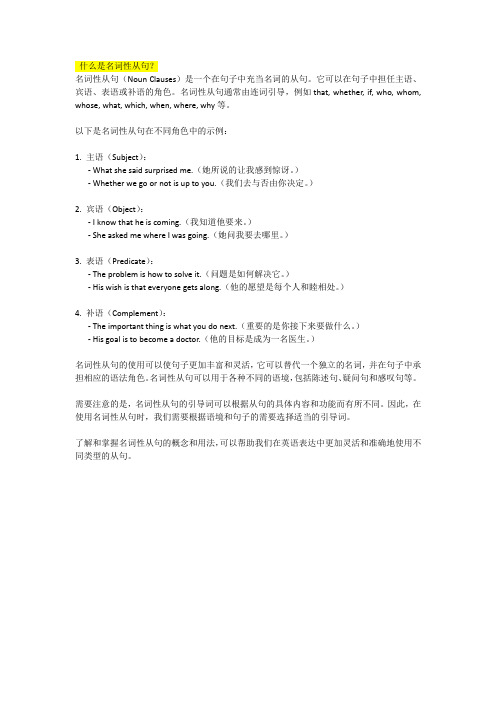
什么是名词性从句?名词性从句(Noun Clauses)是一个在句子中充当名词的从句。
它可以在句子中担任主语、宾语、表语或补语的角色。
名词性从句通常由连词引导,例如that, whether, if, who, whom, whose, what, which, when, where, why等。
以下是名词性从句在不同角色中的示例:1. 主语(Subject):- What she said surprised me.(她所说的让我感到惊讶。
)- Whether we go or not is up to you.(我们去与否由你决定。
)2. 宾语(Object):- I know that he is coming.(我知道他要来。
)- She asked me where I was going.(她问我要去哪里。
)3. 表语(Predicate):- The problem is how to solve it.(问题是如何解决它。
)- His wish is that everyone gets along.(他的愿望是每个人和睦相处。
)4. 补语(Complement):- The important thing is what you do next.(重要的是你接下来要做什么。
)- His goal is to become a doctor.(他的目标是成为一名医生。
)名词性从句的使用可以使句子更加丰富和灵活,它可以替代一个独立的名词,并在句子中承担相应的语法角色。
名词性从句可以用于各种不同的语境,包括陈述句、疑问句和感叹句等。
需要注意的是,名词性从句的引导词可以根据从句的具体内容和功能而有所不同。
因此,在使用名词性从句时,我们需要根据语境和句子的需要选择适当的引导词。
了解和掌握名词性从句的概念和用法,可以帮助我们在英语表达中更加灵活和准确地使用不同类型的从句。
名词性从句
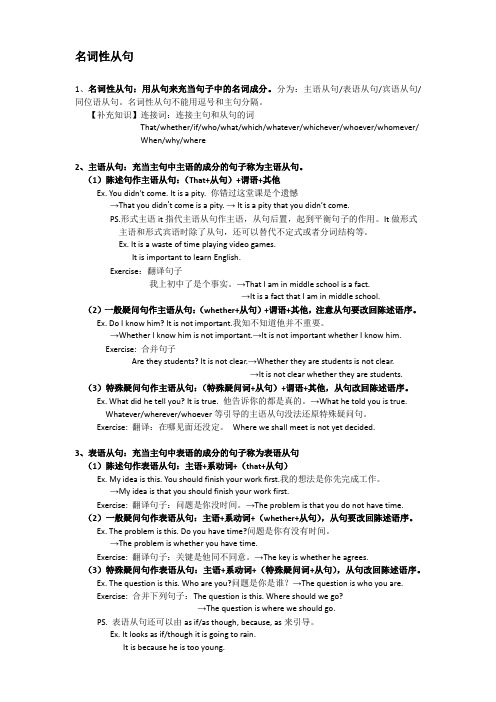
名词性从句1、名词性从句:用从句来充当句子中的名词成分。
分为:主语从句/表语从句/宾语从句/同位语从句。
名词性从句不能用逗号和主句分隔。
【补充知识】连接词:连接主句和从句的词That/whether/if/who/what/which/whatever/whichever/whoever/whomever/When/why/where2、主语从句:充当主句中主语的成分的句子称为主语从句。
(1)陈述句作主语从句:(That+从句)+谓语+其他Ex. You didn't come. It is a pity. 你错过这堂课是个遗憾→That you didn’t come is a pity. → It is a pity that you didn’t come.PS.形式主语it指代主语从句作主语,从句后置,起到平衡句子的作用。
It做形式主语和形式宾语时除了从句,还可以替代不定式或者分词结构等。
Ex. It is a waste of time playing video games.It is important to learn English.Exercise:翻译句子我上初中了是个事实。
→That I am in middle school is a fact.→It is a fact that I am in middle school.(2)一般疑问句作主语从句:(whether+从句)+谓语+其他,注意从句要改回陈述语序。
Ex. Do I know him? It is not important.我知不知道他并不重要。
→Whether I know him is not important.→It is not important whether I know him.Exercise: 合并句子Are they students? It is not clear.→Whether they are students is not clear.→It is not clear whether they are students. (3)特殊疑问句作主语从句:(特殊疑问词+从句)+谓语+其他,从句改回陈述语序。
名词性从句

•
What he wants to tell us is not clear. 他要
跟我们说什么,还不清楚。
主语从句
• T__h_a_t_ he is a famous singer is known to us. • W__h__a_t happened that night will be never
It is a pity that you (should) miss such a good chance.
表语从句
• 在句中作表语的从句叫表语从句。 • 引导表语从句的关联词与引导主语从句的关联词
大致一样。表语从句有时用as if/ as though 引 导;because也可以引导表语从句。如: • That’s just what I want. • It looks as if it is going to rain. ★ 当主语是reason时,表语从句要用that引导而不 是because。如: • The reason why he was late was that he missed the train by one minute this morning.
7. 动词doubt 如果用于肯定句,其后的宾语从句常用 if/whether引导,如果用于否定句或疑问句,宾语从 句则用that引导。如:
I doubt if/whether our football team will win the match.
I don’t doubt that I can defeat him in the contest.
引导主语从句时,从句位于句首用whether,不用if。 Eg: Whether she likes the present is not clear to me. 她是 否喜欢那件礼物我不清楚。 引导表语从句时,用whether, 不用if。例如: His first question was whether Holmes had arrived yet. 它 的第一个问题是福尔摩斯是否已经到了。
名词性从句
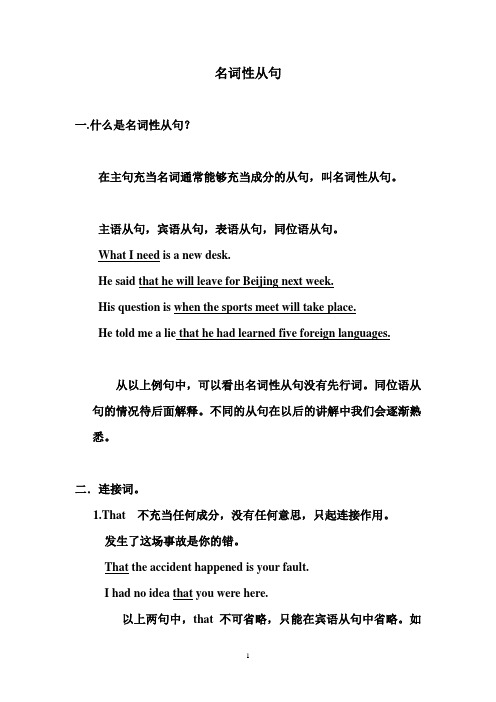
名词性从句一.什么是名词性从句?在主句充当名词通常能够充当成分的从句,叫名词性从句。
主语从句,宾语从句,表语从句,同位语从句。
What I need is a new desk.He said that he will leave for Beijing next week.His question is when the sports meet will take place.He told me a lie that he had learned five foreign languages.从以上例句中,可以看出名词性从句没有先行词。
同位语从句的情况待后面解释。
不同的从句在以后的讲解中我们会逐渐熟悉。
二.连接词。
1.That 不充当任何成分,没有任何意思,只起连接作用。
发生了这场事故是你的错。
That the accident happened is your fault.I had no idea that you were here.以上两句中,that 不可省略,只能在宾语从句中省略。
如果省略的话,句子的意思不清,句子成分也不明。
2.whether, if ( 不做句子成分,有意思,有连接作用)The question is whether the book is worth reading.Whether the pollution can be controlled depends on the effect we will make.以上两句不能用if代替whether.If 只能用于宾语从句,但不能用于介词宾语从句。
He didn’t make sure if (whether)he would take p art in the party.Everything depends on whether we have enough experience.3.连接代词或连接副词(所有疑问代词和疑问副词都可以转为连接代词或连接副词)(做句子成分,有意思,有连接作用。
英语语法:名 词 性 从 句
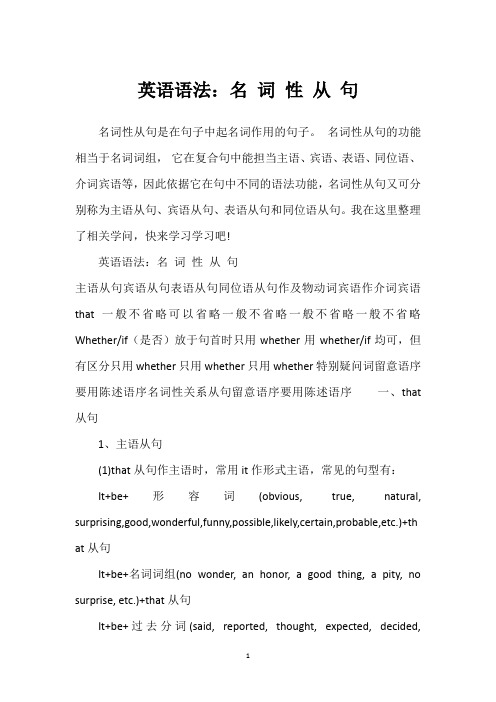
英语语法:名词性从句名词性从句是在句子中起名词作用的句子。
名词性从句的功能相当于名词词组,它在复合句中能担当主语、宾语、表语、同位语、介词宾语等,因此依据它在句中不同的语法功能,名词性从句又可分别称为主语从句、宾语从句、表语从句和同位语从句。
我在这里整理了相关学问,快来学习学习吧!英语语法:名词性从句主语从句宾语从句表语从句同位语从句作及物动词宾语作介词宾语that一般不省略可以省略一般不省略一般不省略一般不省略Whether/if(是否)放于句首时只用whether用whether/if均可,但有区分只用whether只用whether只用whether特别疑问词留意语序要用陈述语序名词性关系从句留意语序要用陈述语序一、that 从句1、主语从句(1)that从句作主语时,常用it作形式主语,常见的句型有:It+be+形容词(obvious, true, natural, surprising,good,wonderful,funny,possible,likely,certain,probable,etc.)+th at从句It+be+名词词组(no wonder, an honor, a good thing, a pity, no surprise, etc.)+that从句It+be+过去分词(said, reported, thought, expected, decided,announced, arranged, etc.)+that从句(2)that可以省略,但that从句位于句首时,that不能省略。
2、宾语从句(1)常见的可以接that从句作宾语的动词有see, say, know, imagine, discover, believe, tell, show, think, consider, be sure, be afraid等。
在可以接复合宾语的动词之后,如think, make, consider等,可以用it作形式宾语。
名词性从句
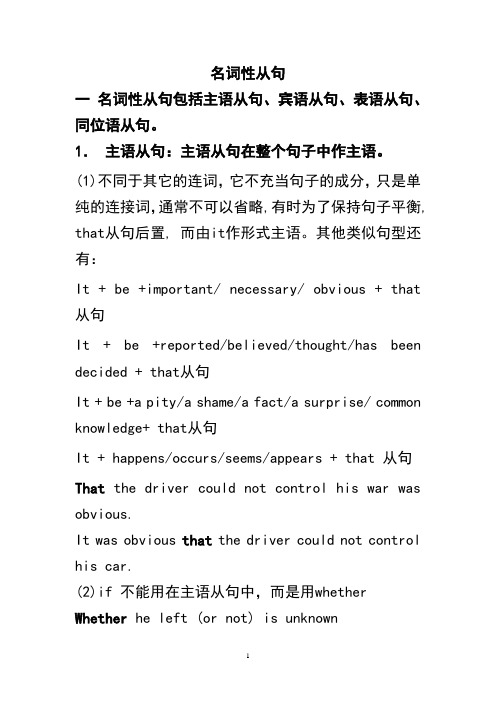
名词性从句一名词性从句包括主语从句、宾语从句、表语从句、同位语从句。
1.主语从句:主语从句在整个句子中作主语。
(1)不同于其它的连词,它不充当句子的成分,只是单纯的连接词,通常不可以省略,有时为了保持句子平衡, that从句后置, 而由it作形式主语。
其他类似句型还有:It + be +important/ necessary/ obvious + that 从句It + be +reported/believed/thought/has been decided + that从句It + be +a pity/a shame/a fact/a surprise/ common knowledge+ that从句It + happens/occurs/seems/appears + that 从句That the driver could not control his war was obvious.It was obvious that the driver could not control his car.(2)if 不能用在主语从句中,而是用whether Whether he left (or not) is unknown(3)当主语从句作主语时,谓语动词一般用第三人称单数What we need is more time and money.What we need are many more books.2.表语从句:表语从句出现在系动词后,充当表语。
其基本结构为: 主语 + 系动词 + that从句。
The trouble is that we are short of money.Go and get your coat. It’s where you left it.3.宾语从句:及物动词,形容词和介词后加宾语从句作其宾语。
(1)宾语从句时态与主句相呼应,但宾语从句表示的是客观真理或普遍现象除外The teacher told us that the earth moves aroundthe sun(2)连词whether和 if可以互换,但注意下列情况连词后紧跟or not时用whether I want to knowwhether or not they will come. 作介词宾语是用whether引导宾语从句He wasinterested in whether he saw her there. 连接词后直接加不定式,不能用if只能用whether Hedoesn’t know whether to stay or not. 如果宾语从句是否定时,一般用if引导I care ifhe will not attend the meeting.(3)当宾语从句后带宾补时,要用“主语+谓语+it +宾补+that-clause,that不可省略I think it certain that she will do well inher exam.(4)当主语是I, we ,主句用think, believe, suppose, expect, imagine五个动词时,用否定转移I don’t think he will win the game, will he?(5)that在宾语从句常可以省略,但由and或 but连接两个或多个宾语从句时,仅可以省略第一个连词that He said (that) he had eaten nothing but that he wasn’t hungry.(6)注意区别if引导的宾语从句和条件状语从句I don’t know if he will come.If he comes, I’ll let you know.注意:beg, insist, desire, command, order, suggest, advise, demand, require, request等动词如果后面加上宾语从句的话, 从句谓语部分必须用should do。
名词性从句讲解
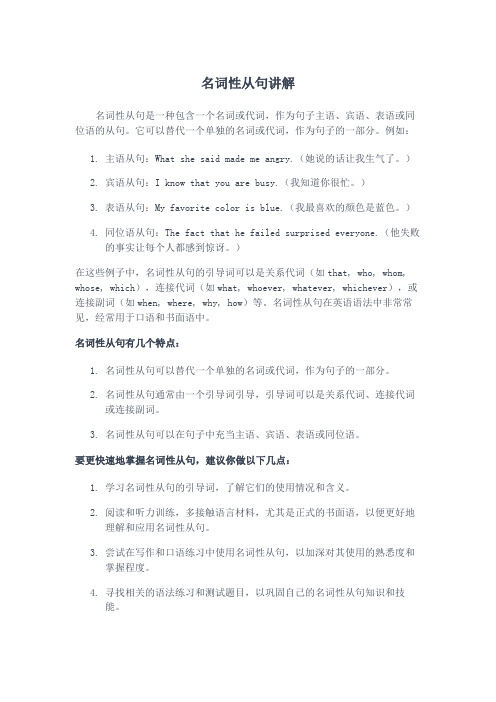
名词性从句讲解名词性从句是一种包含一个名词或代词,作为句子主语、宾语、表语或同位语的从句。
它可以替代一个单独的名词或代词,作为句子的一部分。
例如:1.主语从句:What she said made me angry.(她说的话让我生气了。
)2.宾语从句:I know that you are busy.(我知道你很忙。
)3.表语从句:My favorite color is blue.(我最喜欢的颜色是蓝色。
)4.同位语从句:The fact that he failed surprised everyone.(他失败的事实让每个人都感到惊讶。
)在这些例子中,名词性从句的引导词可以是关系代词(如that, who, whom, whose, which),连接代词(如what, whoever, whatever, whichever),或连接副词(如when, where, why, how)等。
名词性从句在英语语法中非常常见,经常用于口语和书面语中。
名词性从句有几个特点:1.名词性从句可以替代一个单独的名词或代词,作为句子的一部分。
2.名词性从句通常由一个引导词引导,引导词可以是关系代词、连接代词或连接副词。
3.名词性从句可以在句子中充当主语、宾语、表语或同位语。
要更快速地掌握名词性从句,建议你做以下几点:1.学习名词性从句的引导词,了解它们的使用情况和含义。
2.阅读和听力训练,多接触语言材料,尤其是正式的书面语,以便更好地理解和应用名词性从句。
3.尝试在写作和口语练习中使用名词性从句,以加深对其使用的熟悉度和掌握程度。
4.寻找相关的语法练习和测试题目,以巩固自己的名词性从句知识和技能。
名词性从句
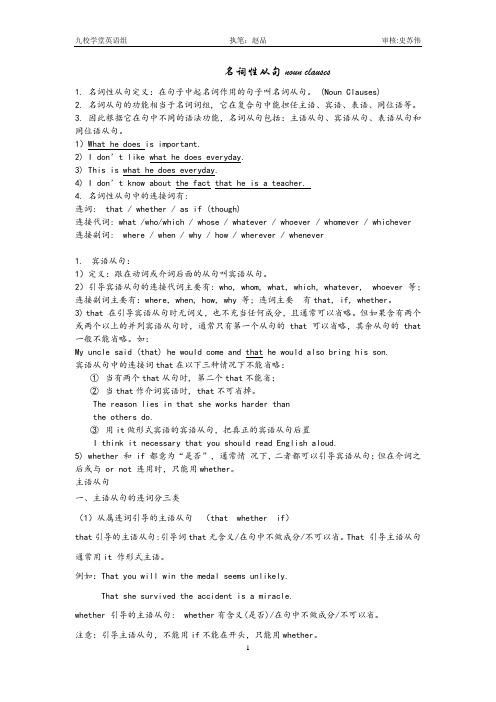
名词性从句noun clauses1. 名词性从句定义:在句子中起名词作用的句子叫名词从句。
(Noun Clauses)2. 名词从句的功能相当于名词词组, 它在复合句中能担任主语、宾语、表语、同位语等。
3. 因此根据它在句中不同的语法功能,名词从句包括:主语从句、宾语从句、表语从句和同位语从句。
1)What he does is important.2) I don’t like what he does everyday.3) This is what he does everyday.4) I don’t know about the fact that he is a teacher.4. 名词性从句中的连接词有:连词: that / whether / as if (though)连接代词: what /who/which / whose / whatever / whoever / whomever / whichever 连接副词: where / when / why / how / wherever / whenever1.宾语从句:1)定义:跟在动词或介词后面的从句叫宾语从句。
2)引导宾语从句的连接代词主要有: who, whom, what, which, whatever, whoever 等;连接副词主要有:where, when, how, why 等; 连词主要有that, if, whether。
3) that 在引导宾语从句时无词义,也不充当任何成分,且通常可以省略。
但如果含有两个或两个以上的并列宾语从句时,通常只有第一个从句的that可以省略,其余从句的that 一般不能省略。
如:My uncle said (that) he would come and that he would also bring his son.宾语从句中的连接词that在以下三种情况下不能省略:①当有两个that从句时, 第二个that不能省;②当that作介词宾语时, that不可省掉。
名词性从句
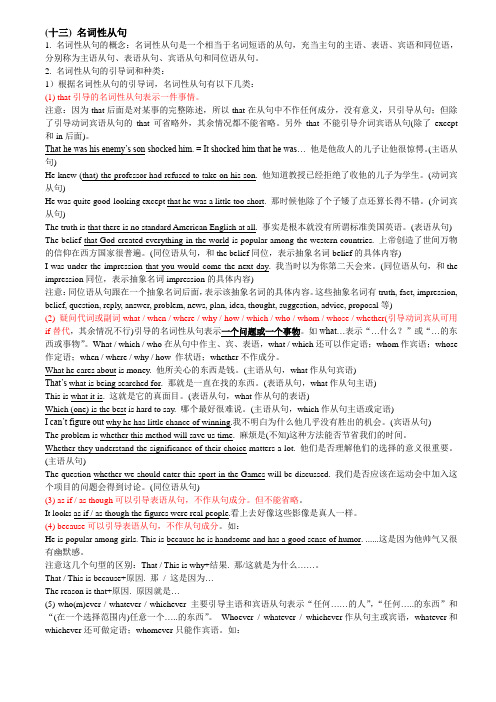
(十三) 名词性从句1. 名词性从句的概念:名词性从句是一个相当于名词短语的从句,充当主句的主语、表语、宾语和同位语,分别称为主语从句、表语从句、宾语从句和同位语从句。
2. 名词性从句的引导词和种类:1)根据名词性从句的引导词,名词性从句有以下几类:(1) that引导的名词性从句表示一件事情。
注意:因为that后面是对某事的完整陈述,所以that在从句中不作任何成分,没有意义,只引导从句;但除了引导动词宾语从句的that可省略外,其余情况都不能省略。
另外that不能引导介词宾语从句(除了except 和in后面)。
That he was his enemy’s son shocked him. = It shocked him that he was… 他是他敌人的儿子让他很惊愕。
(主语从句)He knew (that) the professor had refused to take on his son. 他知道教授已经拒绝了收他的儿子为学生。
(动词宾从句)He was quite good-looking except that he was a little too short. 那时候他除了个子矮了点还算长得不错。
(介词宾从句)The truth is that there is no standard American English at all. 事实是根本就没有所谓标准美国英语。
(表语从句) The belief that God created everything in the world is popular among the western countries. 上帝创造了世间万物的信仰在西方国家很普遍。
(同位语从句,和the belief同位,表示抽象名词belief的具体内容)I was under the impression that you would come the next day. 我当时以为你第二天会来。
什么是名词性从句

什么是名词性从句?名词性从句(Noun Clauses)是在句子中充当名词的从句,它可以在句子中担任主语、宾语、表语或同位语等名词的功能。
名词性从句通常由连接词引导,常见的连接词有:that, whether/if, what, who, whom, whose, which, when, where, why, how等。
名词性从句的引导词具有句子成分的作用,而且名词性从句本身可以在句子中充当名词的角色。
下面是名词性从句在不同句子成分中的应用:1. 主语:名词性从句可以作为句子的主语,来引导句子的主要论点或主题。
- That she is a talented singer is well known.(从句作主语)- Whether we will go camping depends on the weather.(从句作主语)2. 宾语:名词性从句可以作为句子的宾语,接受动词的作用。
- He asked what time the train would arrive.(从句作宾语)- I don't know where she went.(从句作宾语)3. 表语:名词性从句可以作为句子的表语,用来描述或说明主语。
- The problem is how to solve it.(从句作表语)- Her dream is to become a doctor.(从句作表语)4. 同位语:名词性从句可以作为句子中名词的同位语,用来解释或说明名词的意义。
- The fact that she won the competition is impressive.(从句作同位语)- His belief that honesty is the best policy is admirable.(从句作同位语)名词性从句在句子中起到了名词的作用,可以代替一个名词短语或一个名词,扮演不同的句子成分。
什么是名词性从句
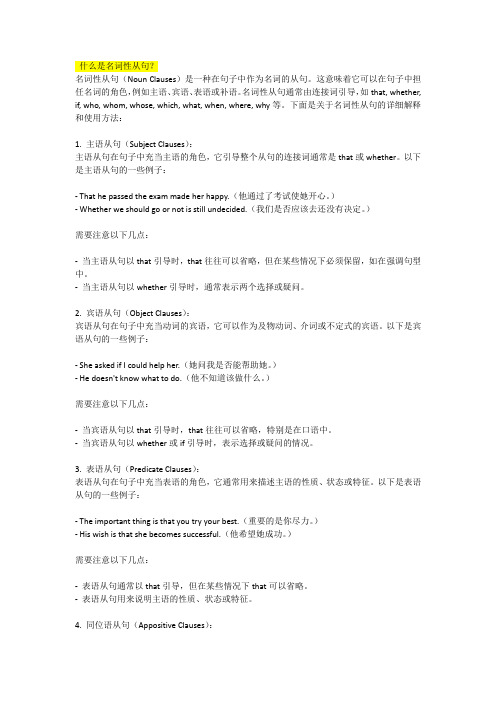
什么是名词性从句?名词性从句(Noun Clauses)是一种在句子中作为名词的从句。
这意味着它可以在句子中担任名词的角色,例如主语、宾语、表语或补语。
名词性从句通常由连接词引导,如that, whether, if, who, whom, whose, which, what, when, where, why等。
下面是关于名词性从句的详细解释和使用方法:1. 主语从句(Subject Clauses):主语从句在句子中充当主语的角色,它引导整个从句的连接词通常是that或whether。
以下是主语从句的一些例子:- That he passed the exam made her happy.(他通过了考试使她开心。
)- Whether we should go or not is still undecided.(我们是否应该去还没有决定。
)需要注意以下几点:-当主语从句以that引导时,that往往可以省略,但在某些情况下必须保留,如在强调句型中。
-当主语从句以whether引导时,通常表示两个选择或疑问。
2. 宾语从句(Object Clauses):宾语从句在句子中充当动词的宾语,它可以作为及物动词、介词或不定式的宾语。
以下是宾语从句的一些例子:- She asked if I could help her.(她问我是否能帮助她。
)- He doesn't know what to do.(他不知道该做什么。
)需要注意以下几点:-当宾语从句以that引导时,that往往可以省略,特别是在口语中。
-当宾语从句以whether或if引导时,表示选择或疑问的情况。
3. 表语从句(Predicate Clauses):表语从句在句子中充当表语的角色,它通常用来描述主语的性质、状态或特征。
以下是表语从句的一些例子:- The important thing is that you try your best.(重要的是你尽力。
(完整版)名词性从句
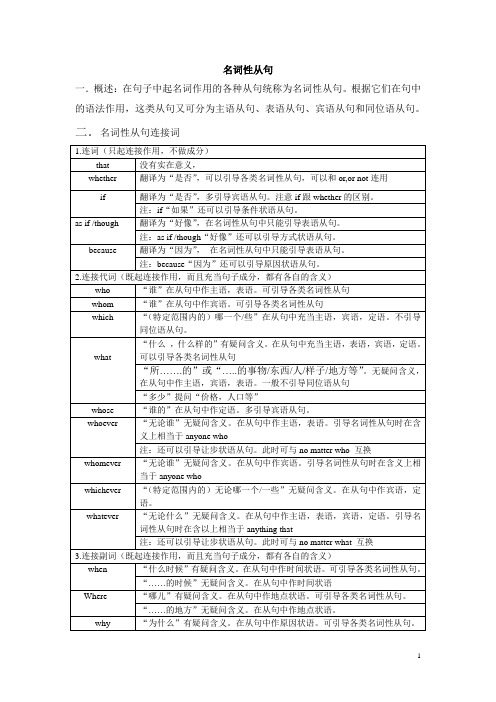
名词性从句一.概述:在句子中起名词作用的各种从句统称为名词性从句。
根据它们在句中的语法作用,这类从句又可分为主语从句、表语从句、宾语从句和同位语从句。
二.名词性从句连接词四.if, whether的区别1.引导主语从句时,如果主语从句放在句首,只能用whether不能用if引导,但是如果用it 做形式主语,而把主语从句放在句末时,也可以用if引导.2.引导宾语从句时常放在动词know, ask, care, wonder之后,if和whether均可。
少数动词,如: leave, put, discuss, doubt后的宾语从句常用whether. 。
3.在介词后面的宾语从句中,在表语从句、同位语从句中,表“是否”,只能用whether;4.whether和if都可以和or not连用,但是whether 之后可以直接跟or not,而if不可以。
I do n’t know whether or not I will stay.(只能用whether)5.在不定式前只能用whether.如:I can’t decide whether to stay. 我不能决定是否留下。
五.与“命令、要求、建议”等相关的名词性从句中通常用虚拟语气,虚拟语气的构成是“should+动词原形”或省去should,直接用动词原形。
六.名词性从句以考查引导词为主,同时考查时态,语序,与其它从句的区别以及混同虚拟语气的考查。
一.主语从句1.主语从句定义:在复合句中充当主语的句子叫做主语从句。
That he will succeed is certain.Whether wild life can be well protected is of great importance.Who will go makes no different.Which kind of food is the best is still not certain.What is needed for the space trip is careful preparation.Whoever comes is welcome.How we can help the twins will be discussed at the meeting.When they’ll start the project has not been decided yet.Where he hid the money is to be found out.Why dinosaurs died out remains a puzzle.2.主语从句引导词按照在句中是否做成分主要分为三类:连词that、whether、if 连接代词、连接副词。
- 1、下载文档前请自行甄别文档内容的完整性,平台不提供额外的编辑、内容补充、找答案等附加服务。
- 2、"仅部分预览"的文档,不可在线预览部分如存在完整性等问题,可反馈申请退款(可完整预览的文档不适用该条件!)。
- 3、如文档侵犯您的权益,请联系客服反馈,我们会尽快为您处理(人工客服工作时间:9:00-18:30)。
名词性从句名词性从句相当于名词,可分别作主句的主语、表语、宾语和同位语。
因此,名词性从句厅分为主语从句、表语从句、宾语从句和同位从句。
(一)引导名词性从句的连接词1、连接代词:who, whose, whom, what, which。
有词义,在从句中担任成分,如主语、表语、宾语、或定语等。
2、连接副词:when, where, why, how。
有词义,在从句中担任成分,作状语。
3、连接词:that, whether, if, as if。
that 无词义,在从句中不担任成分,有时可省略;if (whether), as if虽有词义,但在从句中不担任成分。
注意:连接代词与连接副词在句中不再是疑问句,因而从句中谓语不用疑问式。
连接代词与连接副词在从句充当句子成分,连接词whether 和if(是否),as if(好象)在从句中不充当句子成分,只起连接作用。
根据句义,如果连接代词与连接副词,whether、if 和as if 都用不上时,才用that作连接词(that本身无任何含义)。
(二)主语从句1、主语从句在复合句作主语。
e.g. Who will go is not important.2、用it作形式主语,主语从句放在句末。
e.g. It doesn’t matter so much whether you will come or not.3、that引导主语从句时,不能省略。
e.g. That he suddenly fell ill last week made us surprised.(三)表语从句1、表语从句在复合句中作表语,位于系动词之后。
e.g. The question was who could go there.2、引导表语从句的连接词that有时可省去。
e.g. My idea is (that) we can get more comrades to help in the work.(四)宾语从句1、宾语从句在复合句中作宾语。
引导宾语从句的连词that一般可省略。
e.g. I hope (that) everything is all right.2、介词之后的宾语从句,不可用which或if连接,要分别用what或whether。
e.g. I’m interested in whether you’ve finished the work..I’m interested in what you’ve said.3、whether与if都可以引导宾语从句,常可互换。
但下面情况不能互换。
①宾语从句是否定句时,只用if,不用whether。
e.g. I wonder if it doesn’t rain.②用if 会引起误解,就要用whether。
e.g. Please let me know whether you want to go.(此句如果把whether改成if,容易当成条件句理解)③宾语从句中的whether 与or not直接连用,就不能换成if;不直接连用,可换。
e.g. I don’t know whether or not the report is true.I don’t know whether/ if the report is true or not.④介词后的宾语从句要用whether引导。
whether 可与不定式连用。
whether也可引导主语从句、表语从句、同位语从句,还可引导让步状语从句,以上均不能换成if。
但引导条件从句时,只能用if,而不能用whether。
e.g. It depends on whether we have enough time.They don’t know whether to go there.Please come to see me if you have time.(五)同位语从句同位语从句在句中作某一名词的同位语,一般位于该名词(如:news, fact, idea, suggestion, promise等)之后,说明该名词的具体内容。
e.g. I have no idea when he will be back.The fact that he had not said anything surprised everybody.练习:名词性从句一、判断下列各句哪句含有名词性从句,并指出是什么从句:1. China is no longer what it used to be.2. The truth that the earth turn around the sun is known to all.3. It was snowing when he arrived at the station.4. How he persuaded the manager to change the plan is interesting to us all.5. The news that they had won the game soon spread over the whole school.6. The news that you told me yesterday was really disappointing.7. That is where Lu Xun used to live.8. He spoke as if he understood what he was talking about.9. Do you remember the teacher who taught us English at middle school?10. I wonder why she refused my invitation.二、用适当的连词填空:1. I can’t decide ____________ dictionary I should buy.2. That’s____________ he refused my invitation.3. I am very interested in ____________ he has improved his pronunciation in such a short time.4. ____________ we need is more time.5. The fact ____________ she had not said anything at the meeting surprised everybody.6. ____________ and ____________ they will meet has not been decided yet.7. Please tell me ____________ you are waiting for.8. Is that ____________ you are looking for?9. Would you please tell me ____________ the nearest post office is?10. I don’t know ____________ he will agree to the plan or not.三、选择填空:1. Do you see _____ I mean?A. thatB./C. howD. what2. Tell me_____ is on your mind.A. thatB. whatC. whichD. why3. We must stick to _____ we have agreed on.A. whatB. thatC. /D. how4. Let me see _____.A. that can I repair the radioB. whether -I can repair the radioC. I can repair the radioD. whether can I repair the radio5. Keep in mind _____.A. that the teacher saidB. what did the teacher sayC. that did the teacher sayD. what the teacher said6. Could you advise me _____?A. which book should I read firstB. what book should I read firstC. that book 1 should read firstD. which book I should read first7. He was criticized for _____.A.he had done itB. what he had doneC. what had he doneD. that he had done it8. Would you kindly tell me _____?A. how can I get to the Beijing Railway StationB. how I can get to the Beijing Railway StationC. where can I get to the Beijing Railway StationD. whether can I get to the Beijing Railway Station9. Mrs. Smith was very much impressed by _____.A. what had she seen in ChinaB. that she had seen in ChinaC. what she had seen in ChinaD. which had she seen in China10. We took it for granted ___A. that they were not comingB. that were they not comingC. they were coming notD. were they not coining11. I really don't know _____A. I should do nextB. what should I do nextC. wha t I should do nextD. how I should do next12. I'm afraid _____.A. the little girl will have to be operated onB. that will the little girl have to operate onC. the little girl will have to operate onD. that will the little girl have to be operated on13. She walked up to _____ .A. where did I standB. where I stoodC. I stood thereD. where I stood there14. Can you tell me _____?A. who is that gentlemanB. that gentleman is whoC. who that gentleman isD. whom .is that gentleman15. We'll give you _____.A. that do you needB. what do you needC. whatever you needD. whether do you need16. They want us to know _____ to help us.A. what can theyB. what they canC. how they canD. how can they17. We must put _____ into practice.A. what we have learnedB. that we have learnedC. that have we learnedD. what have we learned18. Did she say anything about _____?A. that the work was to be doneB. how was the work to be doneC. that was the work to be doneD. how the work was to be done19. He was never satisfied with _____.A. what she had achievedB. had what she achievedC. she had achievedD. that she achieved20. These photographs will show you _____.A. what does our village look likeB. what our village looks likeC. how does our village look likeD. how our village looks like21. Peter insisted _____ he pay the bill.A. on thatB. whatC. thatD. on which22. They urged _____ the library open during the vacation.A. whenB. whereC. whyD. that23. We wish we could have learned _____ when we were at high school.A. what you didB. that you had doneC. that what you didD. what did you do24.1 will describe to you _____ I saw when there.A. whatB. thatC. whichD./25. From _____ I should say he is a good worker.A. what 1 know of himB. that I do know of himC. what do I know of himD. that do I know of him26. I will give this dictionary to __ wants to have it.A. whomeverB. anyoneC. whoeverD. someone27._____ they will come here hasn' t been decided yet.A. Wha tB. ThatC. WhenD. Where28. _____ was said here must b e kept secret.A. WhoB. The thingC. WhateverD. Where29. It is still a question _____ we shall have our sports meet.A. ifB. thatC. whatD. when30. I'm going anyway. _____ she will go is up to her to decide.A. If or notB. Whether or notC. IfD. That31. It is strange _____ she have left without saying a word.A. thatB. whatC. whyD. how32. It is very clear _____ our policy is a correct one.A. whatB. thatC. whyD. where33. _____ Mr Zhang said is quite right.A. ThatB. WhenC. WhatD. Whether34. It has been decided _____ he will be sent there.A. ifB. whetherC. whyD. that35. It doesn' t matter _____he' s come back or not.A. ifB. whet herC. thatD. when36. It's a great pity _____ we won’t be able to finish the task on time.A. whenB. thatC. whyD. where37. It happened _____ I wasn't there that day.A. whenB. whyC. whereD. that38._____ you have done might do harm to other people.A. WhatB. ThatC. WhichD. The things39. _____ leaves the room last ought to turn oft the lights.A. AnyoneB. The personC. WhoeverD.Who40._____ the 2000 Olympic Games won't be held in Beijing is known to all.A. WhetherB. IfC. WheneverD. That41. _____ fails to see this will make a big mistake.A. ThatB. WhoeverC. WhetherD. Whether or not42. __ we need m ore equipment is quite obvious.A. WhatB. WhetherC. ThatD. Whatever43. Has it been announced _____?A. when are the planes to take offB. that are the planes to take offC. where are the planes to take offD. when the planes are to take off44. That is _____ we all support his idea.A. whatB. whyC. whereD. when45. That’s _____ we should do.A. thatB. whatC. howD. why46. _____ is troubling me is _____ I don’t understand _____ he saidA. What; that; whatB. What; what; whatC. That; that; whatD. Why; that; which47. Things were not _____ they seemed to be.A. whenB. whyC. thatD. what48. That’s _____ I want to say.A. all whatB. whatC. all whichD. what that49. That’s _____ .A. where our differences lieB. our differences lie thereC. where do our differences lieD. that where our differences lie50. That is _____ .A. where lived he thereB. where did he liveC. where he livedD. that where he lived51. The questions is _____.A. whether is it worth doingB. that if it is worth doingC. whether it is worth doingD. if it is worth doing52. Water will continue to be _____ it is today next in importance to oxygen.A. howB. whichC. whatD. as53. That's_____.A. how did I become a teacherB. how I became a teacherC. how a teacher I becameD. that I became a teacher54. They are just _____.A. that what shall I haveB. what shall I haveC. that I shall have whatD. what I shall have55. It looked ____.A. as if it was going to rainB. that as if it was going to rainC. as if was it going to rainD. as if that it was going to rain56. That's_____.A. how she did itB. that how did she do it.C. how did she do itD. what she did it57. That is _____ we decided to put the discussion off.A. whereB. whichC. thatD. why58. That’s _____ I lived when I was ten years old.A. whereB. at whichC. there whereD. when59. My suggestion is _____ we should send a few comrades to help them.A. ifB. thatC. when thatD. that where60. The idea _____ all people are selfish is wrong.A. whatB. thatC. whyD. if61. We heard the news _____ our team had won.A. thatB. whatC. whetherD. why62. The fact _____ he hadn’t said anything surprised us all.A. whyB. ifC. thatD. whether63.I have no idea _____ she will be back.A. thatB. whereC. that whenD. when64. We must keep in mind the fact _____ China is still a developing country.A. whetherB. thatC. whyD. when65. They have no idea at all _____.A. where he has goneB. where did he goC. where has he goneD. which place he has gone参考答案名词性从句一、1、表语从句;2、同位语从句;3、不是;4、主语从句;5、同位语从句;6、不是;7、表语从句;8、宾语从句;9、不是;10、宾语从句二、1. which; 2. why; 3. how; 4. What; 5. that; 6. when, where; 7. who(m); 8. what; 9. where; 10. whether三、1~5 DBABD 6~10 DBBCA 11~15 CABCC 16~20 BADAB 21~25 CDAAA26~30 CCCDB 31~35 ABCDB 36~40 BDACD 41~45 BCDBB 46~50 ADBAC51~55 CCBDA 56~60 ADABB 61~65 ACDBA。
